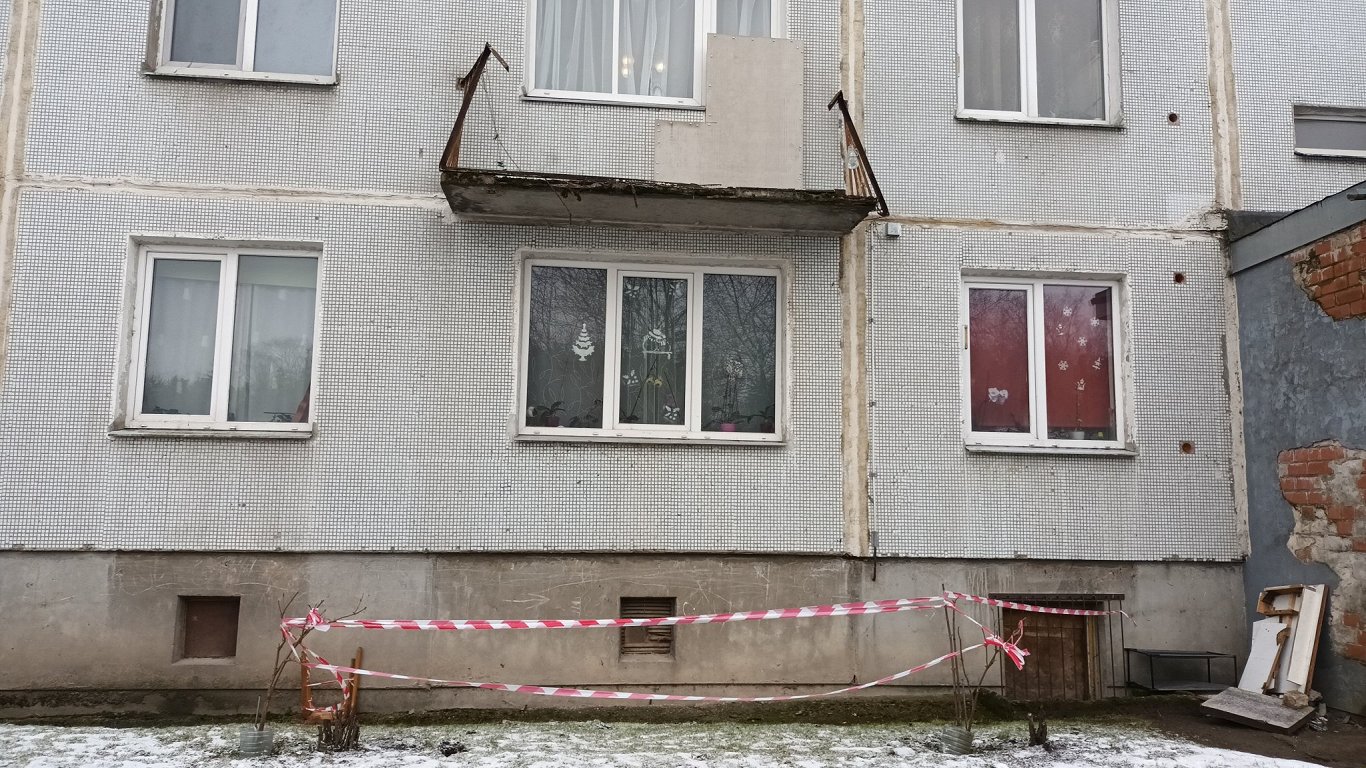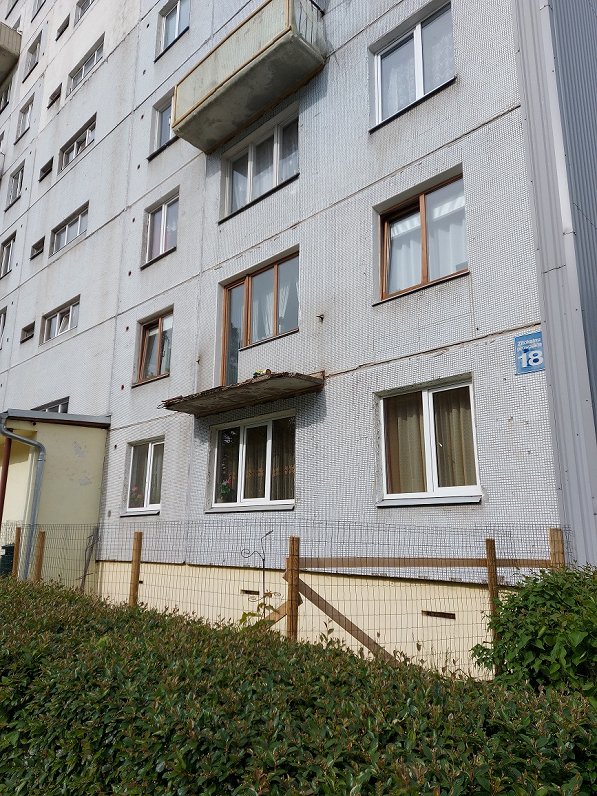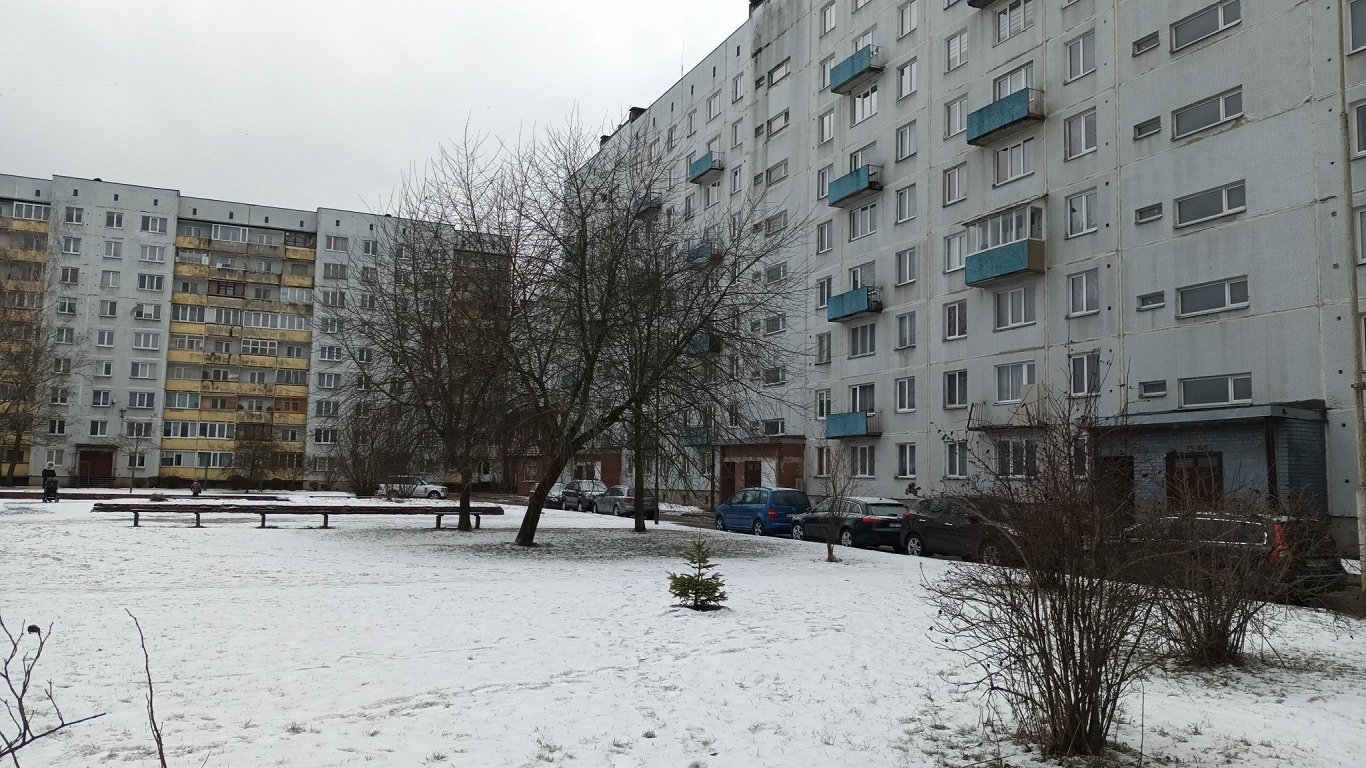ReTV went to the city of Jelgava, where, like in most Latvian cities, multi-apartment buildings were erected in Soviet times. It is immediately noticeable that the paint is peeling off, decorative elements are long gone, and sometimes even parts of balconies plunge to their deaths.
This month, one balcony lost its railing – again. This is not the first incident in the city or even in the house. Jelgava real estate management director Oļegs Kukuts said that there is no exact number but this "is not a normal situation."

"Can't say it happens too often. Problems are in two buildings. In this building, it is the second case. Sure, we survey the houses. We proposed [..] a decision on the expert examination," said Kukuts.
"One of the options is to remove balconies. We have done that in one building. The second option is renovation."
Residents' responsiveness, though, isn't great. One of the reasons is cost, the other – attitude toward communal property.
A Jelgava resident said: "Let the house representative with the real estate management do the thinking."
Another said: "It's tough, few people come. When there was a meeting in April, those who usually come did, about 15 people. We have 76 apartments in the building."

It is not only a problem in Jelgava. A board member of Ogre city housing manager, Kaspars Grīnbergs, said:
"It is now about 20 years since the manager, our predecessor, had noted cracks and fixtures poking out of the balconies."
Balcony survey in Ogre takes place twice a year, only visually checking them from outside. Expert examinations have also taken place and some solutions have been found, but the main issue is the residents' decision. According to Grīnbergs, a tougher regulation should be in place – namely, the decision should be made by somebody else.
"The house manager or the resident cannot interpret the building's bad state as – not that bad, can vote against renovation. Another regulation should be in place, at the state standard level, which says clearly that [..] residents vote for only so long, or decisive action takes place. We are lacking this," said Grīnbergs.

The attitude is changing some, but renovation of buildings is a relatively new process in Latvia as such, according to Ogre housing manager energy efficiency coordinator Jānis Ungurs.
"Many try to refer to the Estonian example. Yes, Estonia is ahead of us quite a bit, but they didn't start off easily either, and they were met with the same issues, they simply were able to adapt quicker. We did it slower, but the past two years have been numerically positive, and some apartment buildings were renovated," said Ungurs.
According to Ungurs, around 20% of apartment buildings are in unsatisfactory or emergency condition. So for many there is still time, but issues should be prevented at an early stage so that it doesn't come to the worst.
A new law for house managing is still in the early stages, but it is progressing.
“If you own a private house, it is clear to anyone that I answer for it, it is my responsibility for the roof, for the surrounding area, for the safety of the surroundings, and so on. When there is a multi-apartment house, this shared understanding begins immediately. The apartment is mine, the house [..] to some extent, and when something bad happens, they don't remember the manager saying long ago that repairs were needed, but say – no, no, you didn't tell me clearly enough,” Chairman of the Board of the Association of Management and Administration of Latvian Housing Ģirts Beikmanis said, adding that the Ministry of Economy is currently developing the new management law, strengthening the community establishments, through which the norms are incorporated that any apartment owner can claim the responsibility of others if their irresponsible decisions have caused harm.
This is already, according to Beikmanis, a step forward in promoting the motivation of apartment owners to engage in property management and decision-making.
“The institute is not a legal person, it is a community, an association of all apartment owners in which you are a member, not a voluntary association but automatically, once you have an apartment in a multi-apartment house, you are a member of the community. And the community has an obligation to take care of their common property. In part, this principle is also enshrined in the existing management law that apartment owners are jointly responsible for their property, but the new management law directly accentuates and clarifies the status of the community,” explained Beikmanis.
He said that at a time when energy prices and tariffs rise sharply, in those houses that have been renovated and warmed, payments for heat are about 50% lower than in unwarmed houses, so it is clearly beneficial to decide on improvements in a timely manner.
State financial institution “Altum” currently has a new energy efficiency program for multi-apartment houses, in which aid for covering partial costs can be obtained from the European Union (EU).
“The program was opened last December, with total funding of about 57 million, and funding in the form of aid will be expected for about 170 homes. In the past, EU aid amounted to up to 50% of the total cost of the project, then in this new program, which has opened, EU aid amounts to 49% of the cost of the project, but it cannot be attributed to the costs of the project, it cannot be included in the VAT resulting from these costs. Consequently, it must be acknowledged that this total aid will not be 49%, but will be between 35% and 40% of the project costs that can be recovered after the project has been carried out,” said Altum's representative Ieva Vērzemniece.
Bank credits are also available. If the bank refuses, Altum also offers loans for repairs, loans with a maturity of up to 20 years to make capital investments gradually by home residents.
The issue of Soviet-time buildings and the problems in coming to renovation works were also covered a while back by EURANET. You can see the story series in our archive: Part 1, Part 2, Part 3, Part 4.





























